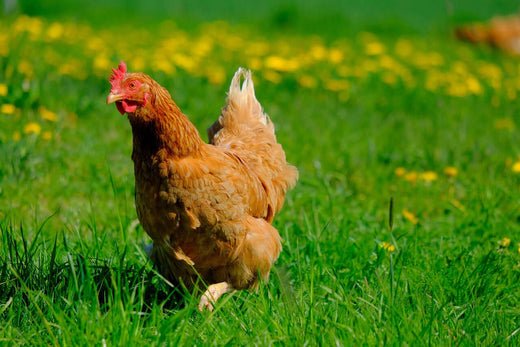
An Insight into Domestic Chickens
Share
Chickens, often overlooked, are gentle souls capable of bringing a wealth of love and joy to many households. Within this blog, we will explore their life cycle, offer essential advice on feeding, and take a closer look at their docile nature.
Life Cycle
Young male chickens are called cockerels whilst young females are called pullets. After approximately a year, the males transform into roosters and the pullets mature into hens. If they choose to mate, the hen will start laying eggs – the incubation period is around 20-21 days and then the chick will hatch.

Chicks grow rapidly – they are classed as ‘babies’ for about a month before transitioning to adolescence. Their fluffy plumage will be replaced with feathers as they reach 4-5 weeks old; at this stage, they will also develop a noticeable pecking order. Once pullets reach 18 weeks, they will likely start to lay eggs. The pullet will sit on her eggs to keep them warm for 20-21 days and the process will start all over again once the chicks hatch…

Egg Colour, Shape & Size
Depending on the breed, chicken eggs can vary in colour, shape, and size. Colours can range from speckled brown, bright white, and delicate baby blue. The eggs are oval shaped, and their weight typically ranges between 45g to 73g.

Housing
Chicken coops are the go-to refuge for domestic chickens. Typically built from wood and enclosed with wire mesh, these coops can be spacious to allow chickens space to exercise and move about. Some people choose to keep their coop door open throughout the day so that their chickens can roam freely however, it is advisable to have all chickens locked in the coop at night as this is when predators such as foxes, are more likely to be roaming. Many chicken coops have roosts installed (elevated wooden planks where chickens can sleep) and an area for nest boxes. The roosts are elevated, as seeking high spots when they rest, mimics a chicken’s natural survival instincts, and the nest boxes are imbedded as these are essential for a hen's wellbeing so she can comfortably lay her eggs.

Feeding
Chickens are natural scavengers and throughout the day, can be seen pecking at the ground. For healthy growth and excellent egg quality, it is essential to provide chickens with clean grain. Haith’s Poultry Corn is a superb daily mix. It contains milo, wheat, and malting barley. To enhance egg condition, Grandad Ted's Poultry Spice™ is a valuable supplement that fosters rich, golden yolks. Chickens are omnivores so will be seen eating insects they find on the ground as well as a variety of vegetables. To aid digestion, grit such as Haith’s Fine Oystershell Grit should be provided.

Health
To maintain a healthy flock, it is vital to keep up-to-date with vaccinations and to keep their environment clean. This will help keep common diseases such as Coccidiosis, Salmonella, and Marek's Disease at bay. It is vital to read up on common illnesses so that symptoms can be spotted early and contained.
Chickens should always have access to fresh drinking water and their coop should be disinfected properly to ensure a safe, living environment.

A Chicken’s Kind Nature
Chickens are inherently social birds and thrive in flocks. They can become quite attached to their owners, seeing them as part of their flock. Their curious nature means that they enjoy exploring their surroundings and scavenging for food. Many breeds are docile, enjoying being held and stroked by their owner – some enjoy being handfed too! Gentle handling is key to maintaining their happiness and eliminating stress.

These docile birds can make fabulous pets; they are relatively low-maintenance and can bring a lot of joy to a home. If you have space in your garden, why not consider getting some chickens? You might even be lucky enough to become part of their flock.
Written by Julianne Jessett
